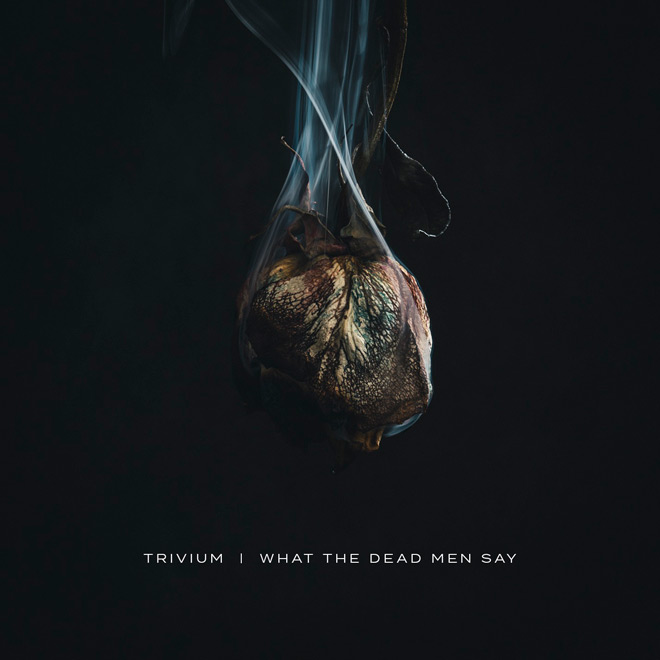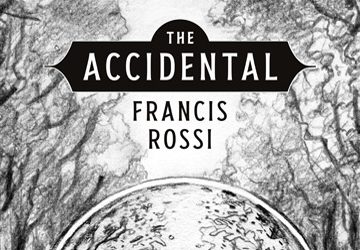
As time has passed, the band has seen many changes both musically and internally, but they have consistently turned out music for the fans representative of their evolution. Nowadays, Trivium consists of Matt Heafy (vocals/guitar), Corey Beaulieu (guitar/vocals), Paolo Gregoletto (bass), and newest member Alex Bent (drums). The guys are preparing to release their ninth studio album and it’s a whole new vibe from the Trivium of old and yet still familiar. Releasing on Friday, April 24th on Roadrunner Records, What The Dead Men Say will usher in a new era for the Sunshine State metallers, but what will that era look like?
Consisting of ten songs, title-track “What The Dead Men Say” rips things open at the start after intro “IX” with some of the best utilization of Trivium’s collective strengths to be heard in quite a while. Between the cinematic quality of the string work and Heafys vocals paired with the powerhouse of Bent’s percussion and bass drum mastery, this song sets the tone and raises the bar for what has to follow. It feels like a call to arms, a rallying of the troops that is sure to rouse the pit at any concert. The album’s lead single “Catastrophist” follows and continues the cinematic trend. With hazy effects over the vocals, in the beginning, there is a sense of whimsicality at the start that evolves and opens up into something lusher at the chorus.
The technical prowess is rich here in the multidimensional layering and composition of the instruments that perfectly mirrors the lyrics and vocal delivery. The title is one of the most interesting choices here since “catastrophist” means “Of, having, or being a theory that explains a situation by positing one or more catastrophic events, as opposed to gradual changes.” This means a person is considered a “catastrophist” if they’d prefer multiple large scale destructive actions take place to exact a change than making less harmful subtle changes over time. Lyrically, this is well reflected in the lamentation Heafy makes – “You’re a catastrophe/The war has come to devastate/ Catastrophist / We never had a chance.”
Moving on, “Bleed Into Me” demonstrates a lot of the growth Trivium has made as a band from their younger years. As they have matured, the band has slowly wavered from their more extravagant grandstanding ways and developed into accomplished and methodical storytellers. This song is a great example of how they have still managed to display their instrumental and vocal dexterity without feeling the need to overproduce. It has a great subtly about it despite still exhibiting moment of intensity which leads directly into “The Defiant.” Here we have moments of Ascendancy-era Trivium with the oversight of an older generation showing restraint and composure. The speed and technical aptitude needed to perfectly compose an engaging and transfixing song with such a detailed breakdown is a talent and Trivium has honed that skill on this album.
“Scattering The Ashes” is an impactful and emotionally turbulent journey that is reminiscent of some of the work they did on 2017’s The Sin and the Sentence. It is somber and yet consuming. A song about loss and the pain of unhealed wounds, “Scattering The Ashes” has an underlying cathartic sentiment that resonates through to the end. Lastly, closing out the album, “The Ones We Leave Behind” is a dichotomous play of ripping chords and chugging bass and percussion with layered vocals, both melodic and guttural. Once again, Bent’s percussion and bass work is infectious and incendiary, leveling up the energy all around. Structurally there are more than simple arpeggios at play here, but dense, expertly crafted string work on display. Heafy and Beaulieu complement one another beautifully here, as well as throughout the album, but it’s hard to deny the signature, provocative skillset of Heafy as a soloist.
Depending on who you are, either the best or the worst thing about this album is that despite a few familiarities, it is unlike any of their previous work. For OG Trivium fans stuck on the old material, this might be a turn-off. For those who have grown with the band over the last twenty years, it is precisely what you hope it would be. What The Dead Men Say is a complex, technically adept, compositionally lush album with layered storytelling, and the added benefit of creators who have fully come into their own as artists. The cinematic feel of this album makes it feel more full and well-rounded while staying intriguing to the ear. It is, at times, both gritty and refreshing, melodic, and intense. This is why Cryptic Rock gives What The Dead Men Say 4.5 out of 5 stars.






